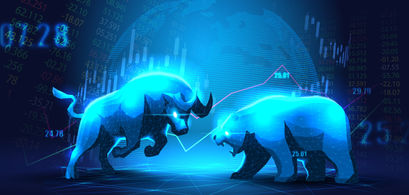Bear markets are a normal part of the stock market cycle, but how long do they typically last? In this article we show you how long the average bear market lasts for, as well as the shortest and longest downturns in history.
There’s a lot of negativity around right now. The stock market is down, there’s concerns over persistent inflation and the R word (recession) is looking increasingly likely.
At times like this it can be easy to feel like the good times are over forever, particularly for investors who see their portfolio deep in the red.
As humans, the high we feel when we win on an investment isn’t equal to the pain we feel when we lose. This concept is known as loss aversion. It means that volatility can feel much more severe than it really is, and it takes strong resolve to be able to stay calm in the middle of the storm.
This is compounded by what’s known as recency bias. This phenomenon means we place more significance on events that have just happened. They feel bigger to us, because they’re fresh in our minds.
The reality is that the overwhelming likelihood is that the current bear market in the US will end, just like all the previous bear markets before it. But how long should investors be expected to wait?
In this article we’re going to look back into the history books and analyze how long the average bear market lasts to see if we can find any clues for the future.
What is a Bear Market?
Very quickly before we dive into looking at past and current bear markets, let’s explain what exactly a bear market is.
It’s really pretty simple, as an official bear market is simply a 20% drop from an all time high. This means that there can be significant volatility within a market without it being an official bear.
10% or 15% falls still feel pretty serious and can make investors jumpy, but they don’t necessarily signal a total turnaround to an upwards trend. Markets will fall by this amount at some point almost every year, even in boom times.
At a 20% drop the scales really tip, and the fact that this is classed as a bear market can also become a self fulfilling prophecy. News coverage is likely to become very negative and investors will be constantly reminded that the market has crashed and is officially in bear territory.
This can cause more investors to sell, which puts additional pressure on markets and can cause them to fall further.
How Long Does the Average Bear Market Last?
Let’s get down to brass tacks. The broadest stock index in the US is the S&P 500, which essentially covers the 500 biggest companies in America. Generally speaking it’s this index that is used when referring to the US stock market.
The average bear market in the S&P 500 lasts just 289 days. Probably shorter than you thought it would be, right? While it may come as a surprise, the average bear market lasts less than a year, and it really highlights how recency bias and loss aversion plays on our emotions.
Not only that, but once the market turns, the average bull market then runs for 3.6 years, with the longest bull run in history lasting a whopping 12 years, from late 1987 until early 2000.
But in the spirit of fairness, it’s not right just to focus on the averages. There have been plenty of bear markets that have lasted longer than that, and some that have been over in the blink of an eye.
To get a better understanding of this, let's take a look at some of the previous market crashes to get an idea of the best case, and worst case, scenario.
The Longest Bear Market in History
To find the longest bear market we’ve got to go back to 1973. There were a number of different factors that led to the market crash, including the US dollar coming off the gold standard, an oil crisis, high inflation and negative economic growth.
The bear market lasted from January 1973 through to early October 1974 for a total of 630 days. Overall the index fell 48.20% during the period.
That’s a pretty long time, but considering it’s the longest in history it still lasted less than two years. For investors at the time it would have felt like the longest two years they’d ever experienced, but in the grand scheme of things it really isn’t that long at all.
Once the bear market finally finished in October 1974, it led to a bull market that lasted through to November 1980. Investors who weren’t scared away by the lengthy downturn were rewarded with six years of rising prices.
Not a bad trade off.
The Shortest Bear Market in History
We don’t have to go back anywhere near as far to find the shortest bear market in history. The Covid pandemic was a massive deal. We all know that. It came out of nowhere and changed the world seemingly overnight.
There was widespread panic. No one knew how bad things were going to get and to just what extent the world would be impacted.
The stock market wasn’t immune. The bear market started on 19th February 2020, and in the space of a couple of weeks we saw the US markets tumble over 30%.
Against that backdrop, it’s no surprise that the reaction from governments around the world was swift, and this brought confidence back to the markets very quickly.
Just 33 days later, the bear market was over.
The following two years posted massive growth for the S&P 500, with the index gaining 16.26% for the year in 2020 (despite the huge drop in February) and increasing 26.89% in 2021.
Again, investors who’d sold in a panic would have potentially missed on serious growth in their portfolio.
What does that mean for investors now?
The 2022 bear market officially began on 13th June. If we go by the average bear market length that means it would be over by mid-October and the good times would be back for Christmas.
That may seem a little premature, so what about the worst case scenario?
Well if we take the starting date and add 630 days, we’re looking at March 2024 before the bear market is over. Quite a difference.
Of course, there’s no way to know for sure when exactly the current bear market will end. Who knows, maybe it will last beyond March 2024 and break a new record for the longest ever.
What we do know is that it is almost certain to end at some point. The stock market is simply our economy and society in action. We spend money on things like groceries, clothing, electricity, gas and entertainment. Companies generate revenue from our spending and this is reflected in their share price.
That’s not to say that individual companies can’t fail, they obviously can. Maybe we stop spending money at one grocery store and go to another one instead. Maybe we all cancel Netflix and go back to cable.
Our spending habits can change but that spending will still go somewhere. It means that there will always be companies providing goods and services that we want to pay for, which means there will always be stocks in good companies that investors can buy.
For the market to crash and never recover, it means there’s been a serious breakdown in society and the world as we know it has changed.
That’s not to say it’s impossible. It could happen, but if it did, people are probably going to be more concerned with how to secure their underground bunker rather than what their investment portfolio is doing.
Contributors





